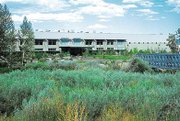More Apparel Retailers and Manufacturers Go Green
The recent spike in oil and gasoline prices has once again raised awareness of energy costs.
Apparel manufacturers and retailers, who consume a good percentage of those resources, have been upping their investments in “green” business practices to counter rising energy prices and do their part for the environment.
Companies such as Serfontaine and Linda Loudermilk in Los Angeles; Patagonia in Ventura, Calif.; and Wal-Mart Stores Inc. in Bentonville, Ark., have launched aggressive agendas focused on energy efficiency and eco-friendly processes during the construction and operation of their stores and workplaces.
In some cases, it’s not by choice. More local governments—including those in San Diego, San Francisco and Portland, Ore.—are starting to institute green building ordinances requiring new development to follow environmentally friendly construction guidelines.
According to the U.S. Department of Energy, builders waste $20 million a year in energy costs during construction. The U.S. Green Building Council said that a 2 percent investment in green building practices could reap 20 percent savings in construction costs.
Patagonia can attest to that. The company’s $19 million service center in Reno, Nev., is packed with efficient features that have saved the company an estimated 35 percent a year in energy costs. Among them are lighting controlled by motion detectors, radiant heating systems, recycled polyester carpets, recycled plastic countertops and walls made from compressed field straw. All paint, drywall, floor coverings and tile have some sort of recycled material.
The roof of the 170,000-square-foot facility is outfitted with 87 solar-tracking mirrors that reflect light to the work floor below. During cooler hours, exhaust fans remove all the hot air from the building. The company also installed an oil/water filtering system that traps water runoff from the building and parking lot and reroutes it into the ground. All wood in the facility has been either reclaimed or sustainably harvested.
Bigger can be better
Wal-Mart will unveil a new store next month in McKinney, Texas, that will feature alternative power sources. The company is also developing a similar store in Aurora, Colo.
The Texas store will be outfitted with wind turbines to provide alternative power generators. The landscaping around the store will feature plants and trees requiring less water than traditional plants. A number of other features will be revealed during a national press conference, during which the project’s architects will discuss Wal-Mart’s conservation efforts.
Wal-Mart has employed environmentally conscious practices elsewhere. Its City of Industry, Calif., store features special skylights that can produce up to 14,000 watts of electricity. The store’s interiors are made from recycled newspaper laminated with resins made from soy flour. The retailer has a similar store in Lawrence, Kan., that uses sustainably harvested wood, solar-powered signage and a rainwater collection system.
This week, The Timberland Co., the apparel and footwear company based in Stratham, N.H., announced it will build a 400-kilowatt solar-power system at its Ontario, Calif., distribution center. This venture is said to be one of the largest solar projects ever constructed in California. Timberland has contracted Northern Power Systems in Waitsfield, Vt., a subsidiary of Distributed Energy Systems Corp., to install about 2,000 photovoltaic modules at the 429,000-square-foot facility. The modules and inverters are expected to produce almost 60 percent of the facility’s electrical load, according to the contractor.
Also included in the project’s design will be “SmartView” remote monitoring software technology, which will allow Timberland to manage and report on the site’s power production in real time from any location via the Internet.
Timberland should also gain rebates of more than $1.5 million under California’s Self-Generation Incentive Program. The new program is expected to create savings in potential critical peak pricing surcharges of as much as $1 per kilowatt hour. It may be put into effect in California over several summers, when power crunches normally occur.
But Timberland’s motivation goes beyond rebates. Green business practices have been an important part of the company’s mission statement, said Betsey Blaisdell, manager of environmental stewardship. “We’re looking at a number of ways in a variety of areas to reduce our footprint, from looking at how much emissions our employees produce by commuting to work to what type of materials we use in manufacturing,” she said.
Timberland offers incentives such as a $3,000 rebate for employees who purchase hybrid cars and cash prizes to others who follow green practices. The company is also using lots of organic cotton.
Going green not only wins kudos from environmentalists but also wins consumers’ hearts. “When they hear about what we do, they’re supportive, and it strengthens their view of the brand,” Blaisdell said.
Save the world
Los Angeles–based denim specialist Mik Serfontaine has also been looking at ways to minimize the effects of manufacturing on the environment. The company opts for hot and cold rinses in addition to hand-grinding techniques rather than the traditional potassium permanganate finishes other manufacturers use. It also uses organic enzymes for washed effects instead of stone washing, which employs pumice, a material Serfontaine said is often strip-mined in third-world countries, devastating the local environment.
“Our customers are not rabid consumers. They prefer to support those brands that are conscientious about their methods,” Serfontaine said. “The end doesn’t always justify the means.”
Los Angeles designer Linda Loudermilk has demonstrated her earth-friendly ways by using organic fabrics. For her first store, set to open on Melrose Avenue early next year, she is planning to use energy-efficient solar lighting as well as other environmentally friendly features.
Other retailers have even more ambitious plans. Shopping-mall developer Robert Congel of New York–based Pyramid Cos. is embarking on an 800-acre green shopping and entertainment complex in Syracuse, N.Y., to be called DestiNY. It will be powered by wind turbines, solar panels, fuel cells and bio fuels—and not one ounce of fossil-fuel-generated power, Congel said.






















